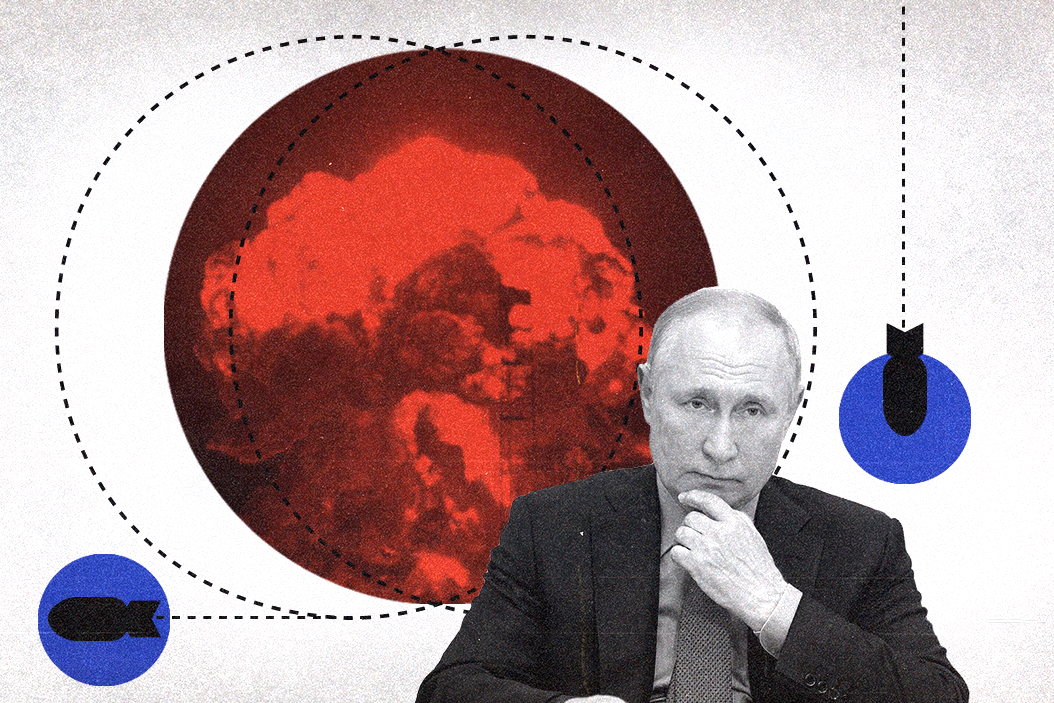Putin to deploy tactical nukes in Belarus
Vladimir Putin on Saturday announced that Russia plans to send tactical nuclear weapons to staunch ally Belarus. Construction of storage units will be completed by July 1, although Putin was vague on when the nukes themselves would be deployed. (Recap: Tactical nukes are lower-yield atomic weapons that can’t take out entire cities like strategic ones.)
The Russian leader said he made the decision after the US and UK announced they would be supplying Ukraine with anti-tank rounds made from depleted uranium. What’s more, Putin believes that Russia is well within its right to do this since America already has US tactical nukes in six NATO countries and that Moscow is not violating its nuclear non-proliferation obligations because it’ll retain control over the weapons.
US officials downplay the idea that storing Russian tactical nukes in Belarus will impact the war in Ukraine, which is already well within range of the Kremlin’s vast nuclear arsenal. But the announcement might be a provocation aimed at rattling Western public opinion against helping Ukraine as Russia struggles on the battlefield. Also, there’s currently no clear path forward for a negotiated settlement despite last week’s high-stakes meeting between Putin and China’s Xi Jinping.
Russia has often played up its nuclear rhetoric when things are not going well in Ukraine. In fact, Putin reportedly considered using tactical nukes last fall but finally decided against it. Still, the fact that the nuclear option is on the table at all should be alarming to anyone.
Israel is on fire. Will Bibi freeze the judicial overhaul?
Tens of thousands of Israelis left their beds and hit the streets late on Sunday night after news broke that Israeli PM Benjamin “Bibi” Netanyahu fired his defense minister, Yoav Gallant. Then on Monday, thousands of demonstrators descended on Jerusalem to protest outside the Knesset (parliament).
Also, Israel’s biggest trade union joined calls for a general strike for the first time since the creation of the modern state, resulting in Ben Gurion International Airport suspendingall departing flights.
Quick recap: Gallant was the first member of Bibi’s Likud party to have called for the government to suspend judicial reform legislation. A former navy commando, Gallant had demanded a halt on the grounds that the reforms were imperiling national security after scores of soldiers and army reservists said they wouldn't show up for training.
With Israel's economy at a standstill, all eyes are now on Netanyahu, who is reportedly planning to announce that he’ll put his plans on ice. But his national address has been delayed.
Meanwhile, high-profile government ministers — including Justice Minister Yair Levin, the architect of the controversial reforms — said they would support the PM if he halts the legislation, fearing it will lead to the collapse of the government. That’s a non starter for far-right National Security Minister Itamar Ben Gvir, who threatened to topple the government if it backs down on the changes.
Still, many analysts and academics now believe that Netanyahu, the ultimate political survivor, has overplayed his hand this time around and that nothing will placate protesters but the end of the Bibi era once and for all.
More For You
For many in Iran, it’s a waiting game for how long Ayatollah Khamenei has left to live.
Most Popular
In a 30-minute call on Thursday, President Donald Trump reportedly told Ukrainian President Volodymyr Zelensky he wants to end the war with Russia as soon as possible — aiming for a deal by summer, but ideally within weeks.
Former British ambassador to the U.S. Peter Mandelson leaves his residence after he was released following his arrest by London police on Monday on suspicion of misconduct in public office, following the release of U.S. Justice Department files linked to the late financier and convicted sex offender Jeffrey Epstein, in London, Britain, February 26, 2026.
The ghost of Jeffrey Epstein continues to haunt the world.
Think you know what's going on around the world? Here's your chance to prove it.
